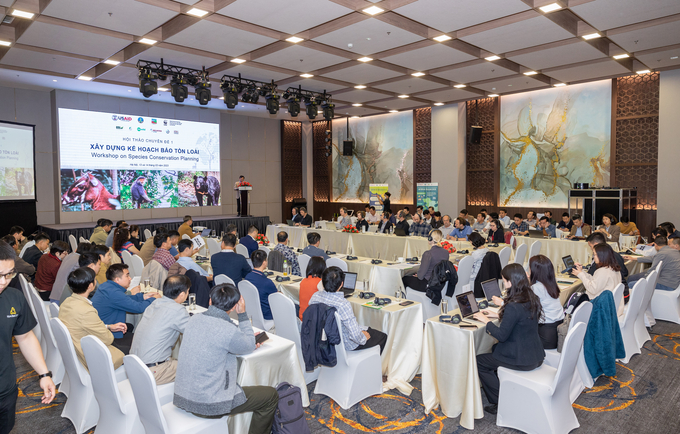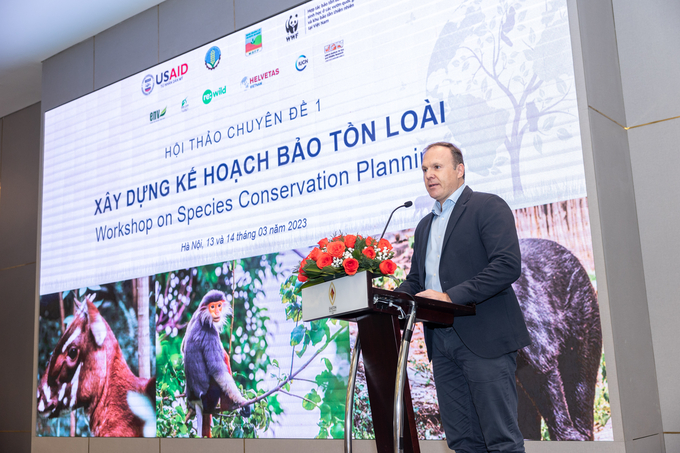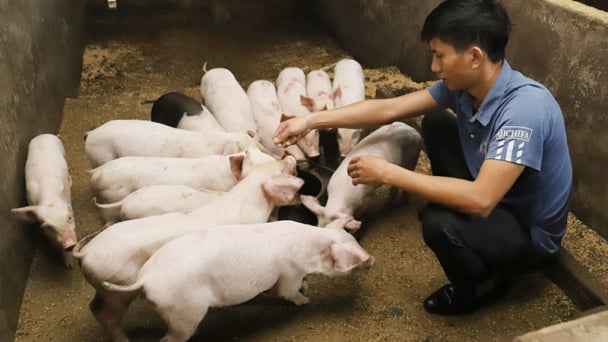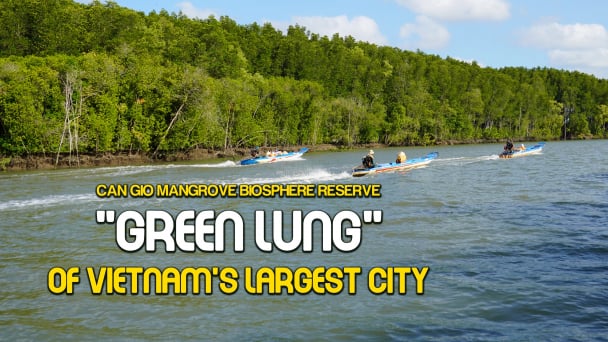June 20, 2025 | 04:50 GMT +7
June 20, 2025 | 04:50 GMT +7
Hotline: 0913.378.918
June 20, 2025 | 04:50 GMT +7
Hotline: 0913.378.918

Series of seminars on species conservation held in Hanoi.
A series of seminars on species conservation was organized to create a premise for building a conservation plan for endangered, precious, and rare animal species prioritized for protection, in the period of 2023-2035. The series of seminars was held from March 13 to 17, 2023 in Hanoi. It has the participation of national and international species conservation experts, technical staff, and managers of special-use forests, and forest protection.
The seminars are organized by Biodiversity Conservation Component - Sustainable Forest Management and Biodiversity Conservation in Vietnam (VFBC). The United States Agency for International Development (USAID) funded the project. Conservation experts from Re:wild and the Conservation Displacement Expert Group of the Species Survival Commission (SSC) – IUCN expertly led the seminars.
The series of seminars focused on 3 topics: "Developing a species conservation plan", "Practical concept of releasing, moving, and rewilding" and "Developing a plan for species re-release".
Rewilding is an approach that includes activities: restoring natural ecosystems, returning native species to their habitat, and protecting ecological cycles. Rewilding can help restore biodiversity and improve ecosystem functions and tasks. It can also help enhance the resilience of ecosystems to environmental stressors and climate change.
Vietnam is one of the countries with high biodiversity in the world, with a large number of endemic plant and animal species. However, over the past few decades, Vietnam has experienced rapid economic growth and development, which has resulted in the destruction of natural habitats, overexploitation of resources, and loss of biodiversity.
Habitat loss: biodiversity loss, degradation, and fragmentation are major threats to Vietnam's biodiversity. Many areas of forests, wetlands, and other ecosystems have been destroyed or degraded by agricultural expansion, logging, mining, and urbanization, as well as the loss of wildlife populations that help maintain forest functions. Rewilding can help restore and reconnect fragmented habitats, creating larger and more diverse ecosystems that can support more species.
Declining populations of wild species: Many species in Vietnam are at risk of extinction due to habitat loss, hunting, and other human activities. Hunting for wildlife over the past decades in Vietnam has caused the phenomenon of an "empty forest". Very few forests can regenerate naturally, even when threats are significantly reduced.
Rewilding, through the reintroduction of native wildlife species into their original habitats, is one of the approaches to help restore wildlife species in Vietnam in the short and medium term. Many wildlife species have important functions for the forest, such as seed dispersal. Declining wildlife populations are a major factor in forest degradation.
Climate change: Vietnam is a country vulnerable to the impacts of climate change, including rising sea levels, increased frequency and intensity of extreme weather events, and changes in temperature and rain patterns. Rewilding can help increase the adaptability of ecosystems to these impacts, by restoring natural ecological cycles such as carbon sequestration, water cycling, and soil formation.

Mr. Nick Cox, Director of the Biodiversity Conservation Component, funded by USAID, spoke at the workshop.
Overall, rewilding is an important method for restoring and protecting biodiversity in Vietnam, enhancing ecosystem functions and services, and promoting sustainable development.
"We believe that rewilding is the only viable strategy to restore wildlife populations that should be present in Vietnam. If we had introduced the concept of rewilding 20 or 25 years ago, perhaps we could have saved the Saola from extinction. We call on experts and policymakers in Vietnam to work with us to restore species that are still resilient, through rewilding", Mr. Nick Cox, USAID-funded Biodiversity Conservation Component Director stated.
Dr. Barney Long, Senior Director of Conservation Strategy at Re:wild, said: “Restoring natural ecosystems after being severely impacted by human activity is critical to enhancing the effectiveness of species conservation efforts. This process involves the restoration of natural cycles and the complete (or nearly complete) food chain at all trophic levels.
This creates a highly sustainable and self-sustaining ecosystem that creates habitats for not just one but many other species. The development of a Species Conservation Strategy will provide the framework and guidance for effective conservation actions, including the participation of all parties responsible for species.
Creating safe havens for species in National Parks/Reserves is an important first step. The establishment of conservation hatcheries for near-extinct species in Vietnam is an important step to start now. This is to prevent potential extinction while providing the possibility to reintroduce species into Vietnam's National Parks in the future to restore a functioning ecosystem".
"Rewilding has been adopted around the world and there are many successful lessons from which Vietnam can learn. If there's one thing we've learned, it's this: acting early, based on the best information available, and collaborating is the key to success", Dr. Axel Moehrenschlager, Chair of the Conservation Displacement Expert Group of the Species Conservation Committee (SSC) - IUCN said.
Dr. Vu Thanh Nam, Deputy Director of the Department of Special-Use and Protection Forest Management - Vietnam Administration of Forestry said: "The development and issuance of an Action Plan on "Conservation of endangered, rare and threatened animal species" are essential in the near future. This plan will help direct and coordinate conservation efforts and mobilize resources in a unified and synchronized approach. The priority action is to develop scenarios for species with low numbers, solitary populations, or critically endangered species, while actively considering relocation, re-release, and breeding of priority species."
Translated by Hoang Duy

(VAN) Biodiversity is being threatened by traditional remedies made from wildlife. Traditional medicine and humans must change to live in harmony with nature.

(VAN) Agrifood investment and finance solutions for people and the planet.

(VAN) Microplastic contamination has become pervasive in seafood, posing unprecedented challenges for food safety and marine ecosystems.

(VAN) Proactively using vaccines, combined with transport control and enhanced surveillance, is the only viable path toward biosecure and sustainable livestock production in Vietnam.

(VAN) Located in the southeast of Ho Chi Minh City, the Can Gio Mangrove Biosphere Reserve is considered the ‘green lung,’ a solid shield protecting the city.

(VAN) To address plastic pollution, closing the plastic recycling cycle will bring significant economic and environmental benefits.

(VAN) According to the Binh Thuan Department of Industry and Trade, in the first five months of 2025, Binh Thuan's dragon fruit export turnover increased by 20.65% compared to the same period last year.